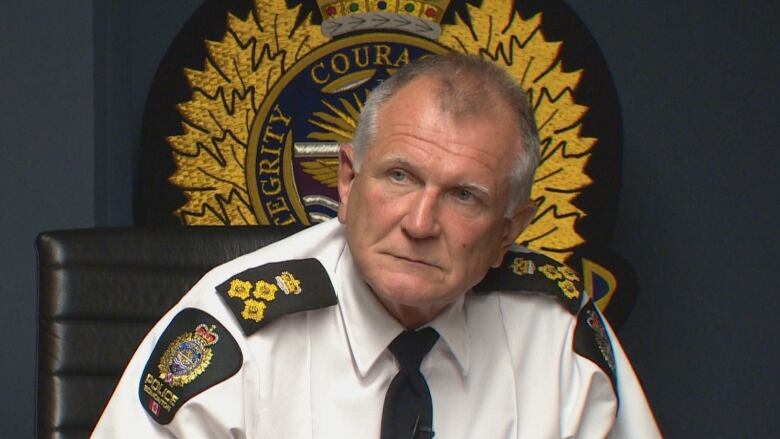Edmonton police chief undecided on LGBTQ apology, memo says
'No clear agreement or resolution' suggests internal memo shared with CBC News

There is "no clear agreement or resolution" on whether the Edmonton Police Service should deliver an apology to the LGBTQ community, according to an internal police memo from Chief Rod Knecht.
The memo, shared with CBC News, was sent to police staff last week and outlines some of the reasons Knecht has yet to deliver an apology for the service's past treatment of the LGBTQcommunity.
"While some want an apology, others believe we have moved beyond the need for one, and that an apology would actually be a setback," Knecht wrote in the memo.
A police spokesperson told CBC News that Chief Knecht was unavailable for an interview.
- Edmonton police owe LGBTQ community an apology, former police commissioner says
- Edmonton police, RCMP, military banned from future Pride parades
- Calgary police apologize for past treatment of 'gender and sexually diverse' people
The memo was circulated just two weeks after Calgary police chief Robert Chaffin delivered an apology for how the police contributed to systemic oppression in that city. Toronto police made an apology in 2016 and Montreal police did the same last year.
"We did not want our apology to be viewed as insincere or trite in following in other's footsteps, but rather genuine and specific to the historical EPS interactions with the community," he wrote.

Shay Lewis, one of the organizers of the protests at this year's Pride Parade, challenged the notion that an apology would mean less because it came after another police service acknowledging its own failures.
"If their apology is going to sound more trite just because someone else apologized, I would question how they're structuring their apology in the first place," Lewis said. "If anything it would mean more that you're willing to follow through with what people are requesting and demanding of you comparatively to just holding out and saying, 'no, no, I'll apologize when I see fit.'"
In the two-page memo, Knecht said the police have been working to build a relationship with the LGBTQ community.
Enforcing the law
He compared the history of criminalizing the LGBTQ community with the approaching legalization of marijuana, saying that officers of the day were duty bound to enforce the law.
"While an imperfect comparison, we see similar circumstances playing out today, where tens of thousands of Canadians have been charged with marijuana related offences resulting in travel and career restrictions," Knechtsaid in the memo.
Former police commissioner Murray Billet said the police were not expected to apologize for the laws, but for the actions of certain police officers that went beyond simple enforcement.
"It's the way they treated the people. They released names. It's the way they marched them out of the bathhouse. It's the ramifications that it had on outing people publicly," he said.
In 1981, Edmonton police raided the Pisces Health Spa, a downtown bathhouse, arresting 60 people. Police also routinely outed gay men by releasing their names, which were then published in newspapers.
The comparison to marijuana, "shows a profound misunderstanding or lack of understanding of what this apology is really about," Billet added.
It's the way they treated the people. They released names. It's the way they marched them out of the bathhouse. It's the ramifications that it had on outing people publicly.- Murray Billet, former police commissioner
An apology has been suggested several times in recent years at the Sexual and Gender Minorities Community Liaison Committee, co-chair and superintendent Brad Doucette told CBC News.
But he said the committee members from the community have not been able to reach a resolution.
"We're getting the whole range of responses from the community," he said. "There was no clear viewpoint from the community that came forward."
Lewissaid the expectation that there would be unanimous agreement from a diverse, intersectional group of people misrepresented the reality of the LGBTQ community.
"Realistically, you're never going to have full agreement from people on how these issues exist, when you have people who exist in that community that don't experience racism and people who exist in that community who do experience racism," Lewis said, pointing to the ways that police carding disproportionately impacts Black and Indigenous people in Edmonton.
In the memo, Knecht said he would meet with the liaison committee on Thursday night to continue discussions. Doucette did not expect the committee would make any decisions.
"This will be an opportunity to seek their unfiltered counsel on this matter and I would invite them to participate in any warranted apology," Knecht wrote.
Billet, who co-founded thecommittee in 1992 and is gay, said the memo was another example of how the chief has missed the mark when it came to issuing an apology.
"We wantto explore and examine and drill down, and all these other things, which is completely unnecessary, completely unacceptable," he said.
"We need the chief to apologize and apologize now and let's move forward."
With files from Andrea Ross and Janice Johnston












_(720p).jpg)


 OFFICIAL HD MUSIC VIDEO.jpg)
.jpg)



























































































